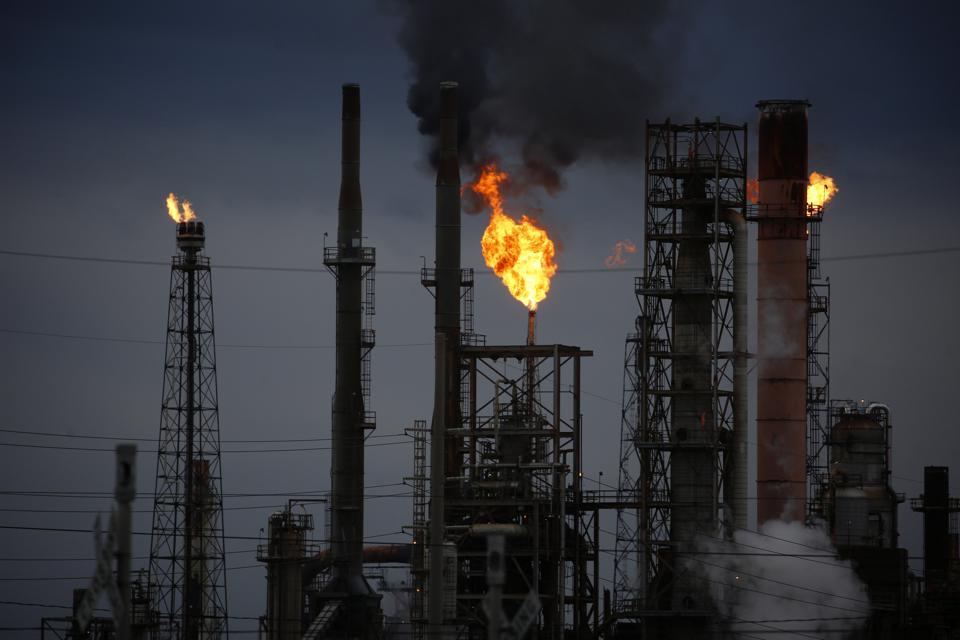Whenever tropical storm systems enter the Gulf of Mexico, as two have this week, most of the focus related to reporting on the oil and gas industry tends to center on efforts by offshore producers to evacuate and secure their operations, especially in the deep waters of the Gulf. That has all been happening this week as well over 80% of the production facilities have been idled in advance of the storms.

Source: Forbes
What gets less attention, but it is equally important to the public, is how these storms impact the refining sector of the oil and gas business.
Three years ago this month, Hurricane Harvey came onshore just north of Corpus Christi and wound its way up and down the Gulf Coast of Texas for the better part of a week before finally moving on. In the process, the flooding and power outages it caused from Corpus Christi all the way east to Baton Rouge took about a quarter of all U.S. oil refining capacity off-line, outages from which it took a month to fully recover.
These refinery outages in turn caused major disruptions in the distribution of refined products, most critically the gasoline that still powers well over 95% of all automobiles in the U.S. The Colonial pipeline system, lacking the line fill provided by Gulf Coast refiners, itself was shut down for weeks. The Colonial system provides a large percentage of gasoline all the way up the East Coast of the United States, and its inability to make deliveries in turn resulted in gas shortages in other parts of the country, helping to create a nationwide spike in prices that lingered for months.
It is a fact of history and business necessity that the majority of U.S. refining capacity has been sited along the Gulf Coast, mainly in Texas and Louisiana. The reasons for this are historically obvious: The first is that Texas has long been among the largest two producers of crude oil, surpassed only by Alaska for a few decades following the development of Prudhoe Bay, and Louisiana and Oklahoma have also long been home to significant oil production.

EIA Map of U.S. oil refineries.CREDIT: US ENERGY INFORMATION ADMINISTRATION (EIA)
But the second reason is even more obvious: That is America’s long-term need to import crude oil from other countries. That dependence on foreign crude really started following World War II and has remained a fact of American life to varying degrees ever since. For many decades, the most cost-effective means of obtaining crude oil as feed stock for a refining operation was to build the refinery somewhere along the coast, and Texas and Louisiana were the most accommodating states in terms of willingness to issue the necessary permits.
A quick look at the EIA refinery map above shows a huge cluster of large-capacity refineries located from Houston east to Lake Charles, Louisiana. The refineries in this area were devastated by Harvey’s flooding, and, as things stand on Wednesday morning, Hurricane Laura is on a path to hit that cluster of refineries again. The storm is currently projected by NOAA to make landfall as Category 3 storm, carrying winds well over 100 mph and a very significant projected storm surge.
As a result, refiners up and down the coast have spent the past 48 hours or so preparing to shut their facilities down, which is the standard procedure in such a situation. The positive news about Laura, from a refinery standpoint, is that it is projected to quickly move north after making landfall overnight, thus minimizing the amount of potentially-flooding rains it is likely to drop on the Gulf Coast area. By contrast, Harvey lingered over Houston for parts of five days, ravaging the region with as much as 51 inches of rainfall.
With any luck, the flood prevention measures employed by all of these refineries will prove to be adequate to contain any potential environmental damage similar to that caused by Harvey, whose floodwaters caused the release of millions of gallons of polluted water into the Houston Ship Channel and other waterways. Most refiners are estimating that their facility operations will be put back online by the weekend. If that’s the case, then the impacts on gasoline prices would be minimal.
Just pray Laura doesn’t linger along the coast like Harvey did.

